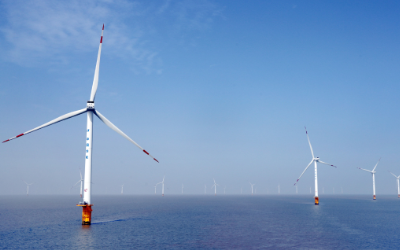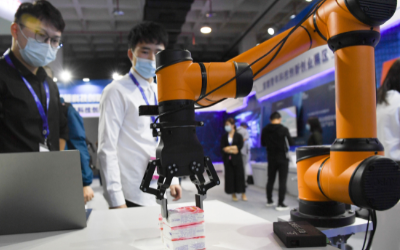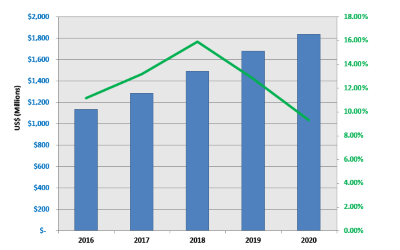External headwinds fail to stymie tech progress
Innovation speeding up despite trade tensions
The Yamal Peninsula in northwest Siberia is usually regarded as one of the most inhospitable places on earth. Even its name means "the end of the land" in the local language.
But a thick layer of ice and extreme cold have failed to stop the quest for what lies deep under the frozen soil.
On the snow-encrusted surface stands the Yamal LNG (liquefied natural gas) plant, a joint venture between China, France and Russia, with an annual output capacity of about 16.5 million metric tons.
The plant, made from high-performance stainless steel supplied by Taiyuan Iron & Steel Co, a State-owned enter-prise in Shanxi province, can cope with the extreme conditions, in which temperatures can drop to as low as -52 C.
In 2014, the company was chosen to supply steel for Yamal LNG. Knowing how hard this task could be, TISCO carried out numerous tests to improve the steel, and was finally able to develop stain-less steel pipes with excellent resistance to cold weather. It has since supplied more than 13,000 tons of special steel to Yamal.
Over the years, TISCO has demonstrated its ability to develop such products. It is the only steelmaker that can mass produce a special type of stainless steel foil just 0.02 millimeters thick, and can be stretched to great lengths. According to TISCO, the technology to produce high-end steel foil has long been dominated by a few countries, such as Germany and Japan.
But after years of independent research and development, TISCO has been able to break into the high-end market with its world-leading products.
TISCO is just one of many examples proving that China's technological development cannot be constrained by external pressures, be they Siberian blizzards, foreign technological dominance in some areas or rising global protectionism.
Industry officials and experts said "external forces", such as increasing trade barriers initiated by the United States, will help speed up the pace at which China comes up with new solutions.
They said that faced with headwinds from outside the country, Chinese companies are poised to speed up domestic innovation, make major changes to operational efficiency and look to consolidate cooperation with markets beyond the US.
Their remarks come as the rhetoric surrounding tariff threats between the world's two largest economies for the past two months has reached a crescendo.
A consensus shared by several Chinese trade and economic experts is that the real intention of the US' tariff measures against China is to contain the country's emerging power, seen in advanced technologies in fields such as high-speed rail construction, 5G technology and mobile payments.
Mei Xinyu, a researcher with the International Trade and Economic Cooperation Institute, a think tank affiliated to the Ministry of Commerce, said that as the US has no plan to deescalate the trade row, the reasonable choice for China is to stand up and fight for its own interests.
Mei described the situation as an "epic trade war", which is a "stress test" for the Chinese economy's resilience, adding, "We need to give full play to our system's advantage, continue to promote reform and opening-up, as well as improve companies' efficiency."
Last month, the US announced a possible list of tariff increases targeting a wider range of Chinese imports worth $200 billion. The Office of the US Trade Representative said it was considering increasing the proposed additional duty from 10 percent to 25 percent.
From Aug 23, the US aims to collect the 25 percent tariffs on an additional $16 billion worth of Chinese imports, according to the trade office. China's Ministry of Commerce responded in kind. Earlier, the two countries had imposed additional tariffs on $34 billion worth of goods from each other.
Different research shows that these tariff increases, if they take effect, would have a limited impact on China. The companies that would be greatly influenced by the US increases operate in three industries: computer, electronic and optical products manufacturing, electrical equipment manufacturing, and machinery making.
Exports from these three industries to the US are expected to fall by 14 percent-or $7 billion-if US tariffs on a combined $50 billion of Chinese goods take effect, according to research led by Li Yimin, an analyst at Shenwan Hongyuan Securities Co.
This would lead to a 0.05 percent fall in China's GDP, Li said in the research note, stressing the impact of the US increases would be limited.
Ma Jun, a member of the policy committee at the People's Bank of China, the central bank, also said the overall impact would be limited. Based on his analysis, the planned US tariffs targeting $50 billion of Chinese goods are forecast to cut China's GDP growth by 0.2 percentage points. The country's GDP grew by 6.9 percent last year.
One industry official said external pressures would not derail the Chinese economy, but lead to increased innovation and entrepreneurship.
Chen Bin, executive vice-president of the China Machinery Industry Federation, said, "The escalating bilateral trade dispute has made the Chinese government and companies realize what core parts and technologies are urgently needed by China to ensure its industrial security and export channels, and that some products can only be achieved through self-innovation and a prolonged research process."
Trade in mechanical and electrical products between China and the US amounted to $100 billion last year, while China shipped $70 billion worth of goods including vehicle and industrial parts, cables, machine tools, pumps and valves to the US market, according to the federation.
As its manufacturing matures, China does not need to rely solely on machinery and parts imported from the US. Germany, Sweden, France, Japan and South Korea can meet the country's demand for various industrial parts and equipment, Chen said.
But in some fields, such as passenger vehicles, petrochemicals equipment and electronic machines, China still needs to catch up with the US. It is still unable to ship large numbers of such products to the US market.
Dong Yang, executive vice-president of the China Association of Automobile Manufacturers, said, "If we had ... invested more in these sectors, many of our manufacturing industries would be performing better globally and would not be easily blackmailed by the US."
Even though Chinese companies have made technological breakthroughs in producing high-quality bearings for high-speed trains and container transshipment vehicles over the past two years, Dong urged domestic players to try to control more of the manufacturing value chain, like their rivals in the US and Germany.
According to a recent Reuters commentary, the more the US tries to block Chinese companies, the more likely they are to come up with their own solutions.
In January, the US barred a takeover of the money transfer agency Moneygram by China's e-commerce giant Alibaba's Ant Financial. As a result, Alibaba created a different, and in many respects more innovative, product using blockchain-based technology.
A blockchain is a growing list of records, called blocks, which are linked using cryptography. Blockchains that are readable by the public are widely used in cryptocurrencies.
Zeng Ming, Alibaba's head of strategic planning, was quoted as saying in an interview with Reuters: "Any new business, while growing up, always encounters obstacles. We understand that. It is part of the cost of doing business. So we might be frustrated, but because the value we create is so overwhelming, we will find some way to overcome that barrier."
Scientific research is an indispensable part of the system to incubate innovative ideas. This month, the State Council, China's Cabinet, decided to revamp the leading group for science, technology and education into a new body that specifically oversees the country's sci-tech sector.
The National Science and Technology Leading Group will be headed by Premier Li Keqiang, who chaired its predecessor, the National Science, Technology and Education Leading Group, since 2013. Vice-Premier Liu He will be the group's deputy head.
The new group will study and review national strategies, plans and major policies in science and technology, deliberate on and approve the country's major sci-tech missions and programs, and coordinate major sci-tech affairs among State Council departments, and between these departments and local governments.
Last month, the central authorities issued a guideline to improve the methods and efficiency of research by 2020, aiming to better allocate resources and motivate researchers to enhance innovation ability.
According to the document, the government will streamline the mechanisms to evaluate research programs and the academic performance of researchers and research institutes. Research programs for different disciplines will have different assessment standards and procedures.
While acquiring new technological knowledge, Chinese companies are looking to expand and consolidate in global markets.
For instance, Li& Fung Ltd, a leading global supply chain solutions partner for consumer brands and retailers, has been reallocating its production to other markets beyond the US to mitigate the potential effects of trade tensions between China and the US, according to Chang Ka Mun, managing director of Li & Fung Development (China).
Wang Bozhi, chairman of China National Heavy Duty Truck Group Corp, one of the largest commercial vehicle manufacturers, said the company is charting new paths into the international market.
Since 2004, the company, better known as Sinotruk, has sold about 350,000 heavy-duty trucks to 116 countries and regions. These markets cover the emerging economies of Central Asia, Africa, the Middle East and South America, as well as developed markets such as Australia and Ireland.
Sinotruk is not alone. When Hisense Electric Co, another consumer electronics company in Shandong province, opened its plant in South Africa in 2013, local employees took buses or used car-pooling to get to work. Now, most of them drive their own cars, and sometimes experience difficulty in finding parking places.
Li Youbo, manager of the South African branch of Hisense, said, "Some of the cars are second-hand or older, but it still highlights the improved incomes and living standards."
Headquartered in Qingdao, a city in East China, Hisense has been expanding its business in South Africa since 2000, when it built a TV production line in Johannesburg. In 2013, it opened another plant in Atlantis, about 50 kilometers from Cape Town. Last year, Hisense produced 261,000 refrigerators and 389,000 televisions in South Africa.
Liu Xin, general manager of Hisense's international marketing department, said Hisense South Africa has hired 700 employees, accounting for more than 90 percent of the staff members in South Africa. Thirty-three of them are senior executives and managers.
Besides TVs and fridges, Hisense's South African plant produces freezers, mobile phones, air conditioners, washing machines and kitchen appliances, which have entered just over 5,000 shops owned by 18 chain stores across South Africa.
Li Daokui, an economist at Tsinghua University and former monetary policy committee member at the People's Bank of China, said US President Donald Trump appeared to rush into decisions to launch the series of tariff threats against China. "He is too anxious to reach a deal," he said.
The Chinese government should maintain "a balanced frame of mind", rather than be irritated by the White House's flip-flopping on trade, given that the two countries are unlikely to solve all their trade disputes in the next few months, Li said.
Zhang Yansheng, a researcher at the China Center for International Economic Exchanges, said solving Sino-US tensions will be a long and bumpy journey.
"By 2035, bilateral relations between China and the US will feature 'irrational confrontation'-meaning these relations will be sometimes be intensified and sometimes pacified," Zhang said. "Risk control and conflict management are of great importance for the two countries and the rest of the world."
Wan Zhe, chief economist at the International Cooperation Center at the National Development and Reform Commission, said China should continue to push ahead with economic reform and opening-up, and work with the rest of the world to support free trade and multilateralism.
Dong Yan, a senior researcher at the Chinese Academy of Social Sciences, said China will stick to its established agenda of reform and opening-up while firmly upholding the multilateral trading system.
But a thick layer of ice and extreme cold have failed to stop the quest for what lies deep under the frozen soil.
On the snow-encrusted surface stands the Yamal LNG (liquefied natural gas) plant, a joint venture between China, France and Russia, with an annual output capacity of about 16.5 million metric tons.
The plant, made from high-performance stainless steel supplied by Taiyuan Iron & Steel Co, a State-owned enter-prise in Shanxi province, can cope with the extreme conditions, in which temperatures can drop to as low as -52 C.
In 2014, the company was chosen to supply steel for Yamal LNG. Knowing how hard this task could be, TISCO carried out numerous tests to improve the steel, and was finally able to develop stain-less steel pipes with excellent resistance to cold weather. It has since supplied more than 13,000 tons of special steel to Yamal.
Over the years, TISCO has demonstrated its ability to develop such products. It is the only steelmaker that can mass produce a special type of stainless steel foil just 0.02 millimeters thick, and can be stretched to great lengths. According to TISCO, the technology to produce high-end steel foil has long been dominated by a few countries, such as Germany and Japan.
But after years of independent research and development, TISCO has been able to break into the high-end market with its world-leading products.
TISCO is just one of many examples proving that China's technological development cannot be constrained by external pressures, be they Siberian blizzards, foreign technological dominance in some areas or rising global protectionism.
Industry officials and experts said "external forces", such as increasing trade barriers initiated by the United States, will help speed up the pace at which China comes up with new solutions.
They said that faced with headwinds from outside the country, Chinese companies are poised to speed up domestic innovation, make major changes to operational efficiency and look to consolidate cooperation with markets beyond the US.
Their remarks come as the rhetoric surrounding tariff threats between the world's two largest economies for the past two months has reached a crescendo.
A consensus shared by several Chinese trade and economic experts is that the real intention of the US' tariff measures against China is to contain the country's emerging power, seen in advanced technologies in fields such as high-speed rail construction, 5G technology and mobile payments.
Mei Xinyu, a researcher with the International Trade and Economic Cooperation Institute, a think tank affiliated to the Ministry of Commerce, said that as the US has no plan to deescalate the trade row, the reasonable choice for China is to stand up and fight for its own interests.
Mei described the situation as an "epic trade war", which is a "stress test" for the Chinese economy's resilience, adding, "We need to give full play to our system's advantage, continue to promote reform and opening-up, as well as improve companies' efficiency."
Last month, the US announced a possible list of tariff increases targeting a wider range of Chinese imports worth $200 billion. The Office of the US Trade Representative said it was considering increasing the proposed additional duty from 10 percent to 25 percent.
From Aug 23, the US aims to collect the 25 percent tariffs on an additional $16 billion worth of Chinese imports, according to the trade office. China's Ministry of Commerce responded in kind. Earlier, the two countries had imposed additional tariffs on $34 billion worth of goods from each other.
Different research shows that these tariff increases, if they take effect, would have a limited impact on China. The companies that would be greatly influenced by the US increases operate in three industries: computer, electronic and optical products manufacturing, electrical equipment manufacturing, and machinery making.
Exports from these three industries to the US are expected to fall by 14 percent-or $7 billion-if US tariffs on a combined $50 billion of Chinese goods take effect, according to research led by Li Yimin, an analyst at Shenwan Hongyuan Securities Co.
This would lead to a 0.05 percent fall in China's GDP, Li said in the research note, stressing the impact of the US increases would be limited.
Ma Jun, a member of the policy committee at the People's Bank of China, the central bank, also said the overall impact would be limited. Based on his analysis, the planned US tariffs targeting $50 billion of Chinese goods are forecast to cut China's GDP growth by 0.2 percentage points. The country's GDP grew by 6.9 percent last year.
One industry official said external pressures would not derail the Chinese economy, but lead to increased innovation and entrepreneurship.
Chen Bin, executive vice-president of the China Machinery Industry Federation, said, "The escalating bilateral trade dispute has made the Chinese government and companies realize what core parts and technologies are urgently needed by China to ensure its industrial security and export channels, and that some products can only be achieved through self-innovation and a prolonged research process."
Trade in mechanical and electrical products between China and the US amounted to $100 billion last year, while China shipped $70 billion worth of goods including vehicle and industrial parts, cables, machine tools, pumps and valves to the US market, according to the federation.
As its manufacturing matures, China does not need to rely solely on machinery and parts imported from the US. Germany, Sweden, France, Japan and South Korea can meet the country's demand for various industrial parts and equipment, Chen said.
But in some fields, such as passenger vehicles, petrochemicals equipment and electronic machines, China still needs to catch up with the US. It is still unable to ship large numbers of such products to the US market.
Dong Yang, executive vice-president of the China Association of Automobile Manufacturers, said, "If we had ... invested more in these sectors, many of our manufacturing industries would be performing better globally and would not be easily blackmailed by the US."
Even though Chinese companies have made technological breakthroughs in producing high-quality bearings for high-speed trains and container transshipment vehicles over the past two years, Dong urged domestic players to try to control more of the manufacturing value chain, like their rivals in the US and Germany.
According to a recent Reuters commentary, the more the US tries to block Chinese companies, the more likely they are to come up with their own solutions.
In January, the US barred a takeover of the money transfer agency Moneygram by China's e-commerce giant Alibaba's Ant Financial. As a result, Alibaba created a different, and in many respects more innovative, product using blockchain-based technology.
A blockchain is a growing list of records, called blocks, which are linked using cryptography. Blockchains that are readable by the public are widely used in cryptocurrencies.
Zeng Ming, Alibaba's head of strategic planning, was quoted as saying in an interview with Reuters: "Any new business, while growing up, always encounters obstacles. We understand that. It is part of the cost of doing business. So we might be frustrated, but because the value we create is so overwhelming, we will find some way to overcome that barrier."
Scientific research is an indispensable part of the system to incubate innovative ideas. This month, the State Council, China's Cabinet, decided to revamp the leading group for science, technology and education into a new body that specifically oversees the country's sci-tech sector.
The National Science and Technology Leading Group will be headed by Premier Li Keqiang, who chaired its predecessor, the National Science, Technology and Education Leading Group, since 2013. Vice-Premier Liu He will be the group's deputy head.
The new group will study and review national strategies, plans and major policies in science and technology, deliberate on and approve the country's major sci-tech missions and programs, and coordinate major sci-tech affairs among State Council departments, and between these departments and local governments.
Last month, the central authorities issued a guideline to improve the methods and efficiency of research by 2020, aiming to better allocate resources and motivate researchers to enhance innovation ability.
According to the document, the government will streamline the mechanisms to evaluate research programs and the academic performance of researchers and research institutes. Research programs for different disciplines will have different assessment standards and procedures.
While acquiring new technological knowledge, Chinese companies are looking to expand and consolidate in global markets.
For instance, Li& Fung Ltd, a leading global supply chain solutions partner for consumer brands and retailers, has been reallocating its production to other markets beyond the US to mitigate the potential effects of trade tensions between China and the US, according to Chang Ka Mun, managing director of Li & Fung Development (China).
Wang Bozhi, chairman of China National Heavy Duty Truck Group Corp, one of the largest commercial vehicle manufacturers, said the company is charting new paths into the international market.
Since 2004, the company, better known as Sinotruk, has sold about 350,000 heavy-duty trucks to 116 countries and regions. These markets cover the emerging economies of Central Asia, Africa, the Middle East and South America, as well as developed markets such as Australia and Ireland.
Sinotruk is not alone. When Hisense Electric Co, another consumer electronics company in Shandong province, opened its plant in South Africa in 2013, local employees took buses or used car-pooling to get to work. Now, most of them drive their own cars, and sometimes experience difficulty in finding parking places.
Li Youbo, manager of the South African branch of Hisense, said, "Some of the cars are second-hand or older, but it still highlights the improved incomes and living standards."
Headquartered in Qingdao, a city in East China, Hisense has been expanding its business in South Africa since 2000, when it built a TV production line in Johannesburg. In 2013, it opened another plant in Atlantis, about 50 kilometers from Cape Town. Last year, Hisense produced 261,000 refrigerators and 389,000 televisions in South Africa.
Liu Xin, general manager of Hisense's international marketing department, said Hisense South Africa has hired 700 employees, accounting for more than 90 percent of the staff members in South Africa. Thirty-three of them are senior executives and managers.
Besides TVs and fridges, Hisense's South African plant produces freezers, mobile phones, air conditioners, washing machines and kitchen appliances, which have entered just over 5,000 shops owned by 18 chain stores across South Africa.
Li Daokui, an economist at Tsinghua University and former monetary policy committee member at the People's Bank of China, said US President Donald Trump appeared to rush into decisions to launch the series of tariff threats against China. "He is too anxious to reach a deal," he said.
The Chinese government should maintain "a balanced frame of mind", rather than be irritated by the White House's flip-flopping on trade, given that the two countries are unlikely to solve all their trade disputes in the next few months, Li said.
Zhang Yansheng, a researcher at the China Center for International Economic Exchanges, said solving Sino-US tensions will be a long and bumpy journey.
"By 2035, bilateral relations between China and the US will feature 'irrational confrontation'-meaning these relations will be sometimes be intensified and sometimes pacified," Zhang said. "Risk control and conflict management are of great importance for the two countries and the rest of the world."
Wan Zhe, chief economist at the International Cooperation Center at the National Development and Reform Commission, said China should continue to push ahead with economic reform and opening-up, and work with the rest of the world to support free trade and multilateralism.
Dong Yan, a senior researcher at the Chinese Academy of Social Sciences, said China will stick to its established agenda of reform and opening-up while firmly upholding the multilateral trading system.








